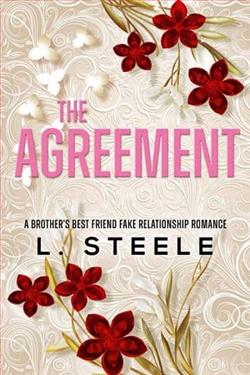Page 73 of What Happened to Lucy Vale
The Rockland County Sheriff’s Department was suffering from the aftershocks of several high-profile resignations the morning she drove to the small brick building next to the library. Two days earlier, Sheriff Cox had abruptly announced his departure. Several longtime officers quit in solidarity. The deputies who remained all had the mournful look of dogs abandoned too long in their crates.
In Cox’s old office, Rachel found Rebecca Horne, previously an assistant district attorney in the county prosecutor’s office and the first woman to hold the position, even provisionally, of Rockland County sheriff. Horne had a permanent squint and a monsoon of paper on her desk. She looked harassed and underslept, and she barely scanned over the stack of threatening letters that Rachel presented.
“I’ve gotta be honest,” she said. “I’m not seeing the threats.” She returned the letters to Rachel. “I wouldn’t worry about it. Probablyjust someone who doesn’t like you very much. You said your daughter is fifteen?”
“Sixteen,” Rachel corrected. They had celebrated Lucy’s birthday just the week before with dinner at the Round on the golf course. Rachel had been hoping for one night alone with her daughter. But Lucy insisted that Noah be invited, or Noah had insisted on it. Rachel couldn’t tell.
“Maybe someone your daughter knows from school,” Horne said. “Teenage beef. It happens.”
That was Noah Landry’s theory too. Rachel hadn’t meant for him, or for Lucy, to learn about the letters. But a few days after the Fourth of July parade, a letter arrived addressed to Lucy.When are you and your mother going toSit Down?? Put lipstick on a pig and it still sleeps in shit. You should be ashamed of yourselves.Lucy had confronted her mother, and Rachel had reluctantly told her about the other letters, dating all the way back to October. Just hours later, Lucy had a theory: it was Reese Steeler-Cox. According to Noah, Reese had been obsessed with him ever since they’d attended a church camp together. She was practically a stalker. That’s why she hated Lucy so much, and why she’d tried to steer Lucy away from Noah.
It was in some ways a comforting theory. But Rachel didn’t buy it.
“Teenagers don’t write each other letters,” Rachel pointed out to the sheriff. “They bully each other online.”
Horne acknowledged that point with a tilt of the head. “You can fill out a report with the desk sergeant,” she said. “That’s about all we can do right now. We’re stretched thin as it is.” Then she added abruptly, “Did you know that Rockland County has one of the lowest rates of prosecution in the state?”
Rachel hadn’t known that. But she wasn’t surprised. No one knew exactly why Sheriff Cox and his dedicated lieutenant had vacated their positions so abruptly. But she’d heard whispers about an independent investigation by the state’s attorney office and a long history ofcorruption. Cases seemed to flounder in Rockland County. People were arrested. People were released. Investigations dragged.
“Is it true you’re thinking of reopening the investigation into Nina Faraday’s disappearance?” Rachel hadn’t meant to ask about the Faradays—not yet—but Horne had given her an opening.
“Who told you that?” Horne asked sharply.
Rachel shrugged. “It’s just something I read online.” The local theory about the shake-up was that the county was under pressure to do something about the Faraday case now that it was garnering statewide, even national, attention.
“The investigation was never closed,” Horne said. Dimly Rachel was aware of the staccato radio static emanating from the main room. A sudden plaint of phones began to ring, one right after the other. Something was happening.
“What about Lydia Faraday’s death?” Rachel asked. Horne’s attention was drifting.
“I won’t comment,” Horne said impatiently.
“Even to a journalist?” Rachel said.
Horne registered no surprise; Rachel figured she’d heard all about the Vales by now. “Especiallyto a journalist.”
Horne stood up, signifying the conversation was over. Rachel took her time, however, returning the notes to an envelope and the envelope to her bag, all while tracking the rising excitement from the officers on duty. She heard something about the drought and the Ohio River levels—lower, she’d read, than they’d been in decades. In certain places the river had curdled into a sludgy brown soup that smelled of wastewater and bacterial bloom. All summer the water had been relinquishing secrets, wheezing old trash onto its shores, coughing up submerged bikes and refrigerators.
She was just inching out of Horne’s office when a deputy shoved past her, too impatient to wait until she was out of earshot.
“That was McKenzie from the French Island Marina,” he said. “Someone found a body in the river.”
Six
We
The rumor that Nina Faraday’s body had at last been found tore across social media for a few short days before the cops revealed the identity of the deceased: a fifty-five-year-old alcoholic from nearby Evanston who’d been reported missing by his family several years earlier after a Memorial Day barbecue. But by then, doubts had fomented across the far corners of the internet. Claims of another cover-up proliferated. In a misguided attempt to quell the rumors, freshmen swimmers Henry Rawlings and Jamie Greene infiltrated the memorial service and snapped pictures of the grieving family to prove they really existed.
We agreed afterward that Henry and Jamie were idiots but not that they should burn in hell like the internet was saying.
Meanwhile, we set out to verify another rumor that the sheriff’s department was intending to reopen an investigation into Lydia Faraday’s death by exhuming her remains.
But first we had to find where she was.
The location of Lydia Faraday’s grave was the subject of local debate. For months after her death, Lydia’s headstone had been vandalized by outraged locals who blamed her for Coach Steeler’s departure—her grave defaced with lewd graffiti, knocked down with heavy equipment, and at one point even stolen altogether. The county had briefly assigned a deputy to patrol the grounds at night to chase off anyone who came with spray paint and a vendetta.
But ultimately Lydia Faraday’s grave was too expensive to maintain.
We knew that Lydia’s body had been relocated from the cemetery behind St. Paul’s Episcopal Church where some of the Faraday relatives were buried some short time after her burial; this formed the backbone of the many legends we’d heard as children about her wandering spirit.















